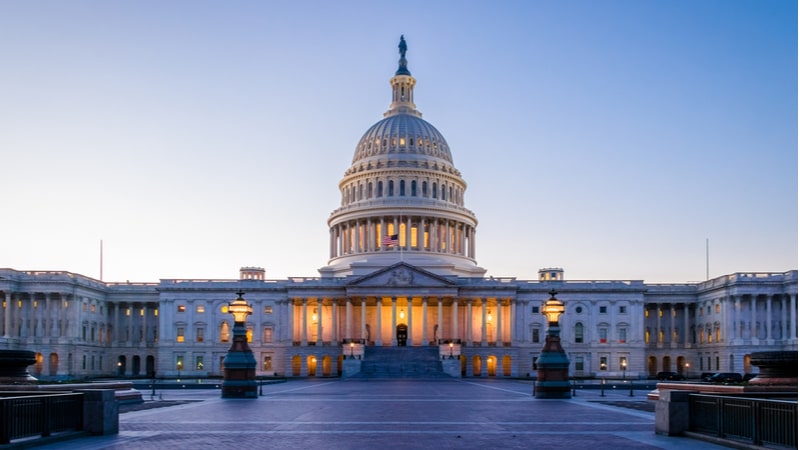
A bipartisan group of 12 senators is calling on the Department of Homeland Security’s (DHS) internal watchdog to investigate the collection of biometric data from airport-based facial recognition technology, citing privacy concerns.
In a Nov. 20 letter addressed to DHS Inspector General Joseph Cuffari, the group of senators – including seven Democrats and five Republicans – expressed concern over the Transportation Security Agency’s (TSA) facial screening technology in use at national airports, writing that the biometrics collected “could become one of the largest federal surveillance databases overnight without authorization from Congress.”
Noting that the technology will soon be in use at “hundreds of major and mid-size airports,” the senators called for oversight of the technology from an “authorities and privacy perspective.”
“TSA has not provided Congress with evidence that facial recognition technology is necessary to catch fraudulent documents, decrease wait times at security checkpoints, or stop terrorists from boarding airplanes,” the senators wrote.
Citing a Washington Post article where a TSA spokesperson reported a three percent false negative rate in identity verification, the senators noted this could result in discrepancies for approximately 68,000 travelers.
“Facial recognition would also fail to stop the hundreds of people who reportedly bypass security checkpoints in a given year,” the senators continued.
Congressional concern over facial recognition technology isn’t new. Late last year, the bipartisan Traveler Privacy Protection Act of 2023 was introduced to the Senate with provisions that would strip TSA of its authority to use the technology to screen airline passengers and require the agency to delete data obtained through its technology.
Earlier this year, a bipartisan group of 13 senators wrote a letter to Majority Leader Chuck Schumer and Minority Leader Mitch McConnell calling to restrict the use of facial recognition through the Federal Aviation Administration Reauthorization Act.
Sen. Jeff Merkley, D-Ore., who has notably been outspoken about the privacy concerns posed by the technology, claimed in a YouTube video that his photo was taken without his prior consent at Reagan National Airport in Arlington, Va., despite signage that said anyone could opt out of the facial scan if requested.
“While the TSA claims facial recognition is optional, it is confusing and intimidating to opt out of TSA’s facial recognition scans, and our offices have received numerous anecdotal reports of Transportation Security Officers (TSOs) becoming belligerent when a traveler asks to opt out, or simply being unaware of that right,” the senator’s letter stated. “TSOs are inconsistently trained on how to respond to passengers who request to opt out and have told passengers they will face delays for opting out.”
TSA stated earlier this year that they plan to expand the use of facial recognition technology alongside artificial intelligence. Kristin Ruiz, the deputy chief information officer (CIO) at TSA, said that the agency is looking to use biometric technology to approve passengers without the need for physical IDs or boarding passes.
“Despite promising lawmakers and the public that this technology is not mandatory, TSA has stated its intent to expand this technology beyond the security checkpoint and make it mandatory in the future,” the senators noted.
The letter requests that the inspector general assess the technology’s effectiveness in detecting disguised or fraudulent travelers; its impact on reducing screening delays; its role in preventing individuals on the no-fly list; potential impacts on workforce reallocations; error rates across demographic groups; and TSA’s communication about passengers’ opt-out rights.
The senators also called for scrutiny of TSA’s biometric data collection, retention, and deletion practices, as well as its compliance with cybersecurity protocols.
In addition to Sen. Merkley, the letter was signed by Sens. Steve Daines, R-Mont., Ron Wyden, D-Ore., Elizabeth Warren, D-Mass., Chris Van Hollen, D-Md., Cynthia Lummis, R-Wyo., Bernie Sanders, I-Vt., Peter Welch, D-Vt., John Kennedy, R-La., Edward J. Markey, D-Mass., Ted Cruz, R-Texas, and Roger Marshall, R-Kan.
